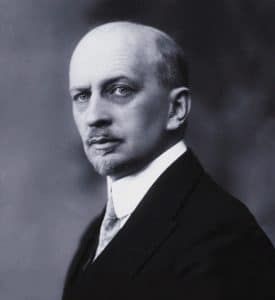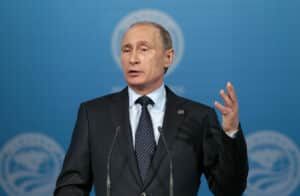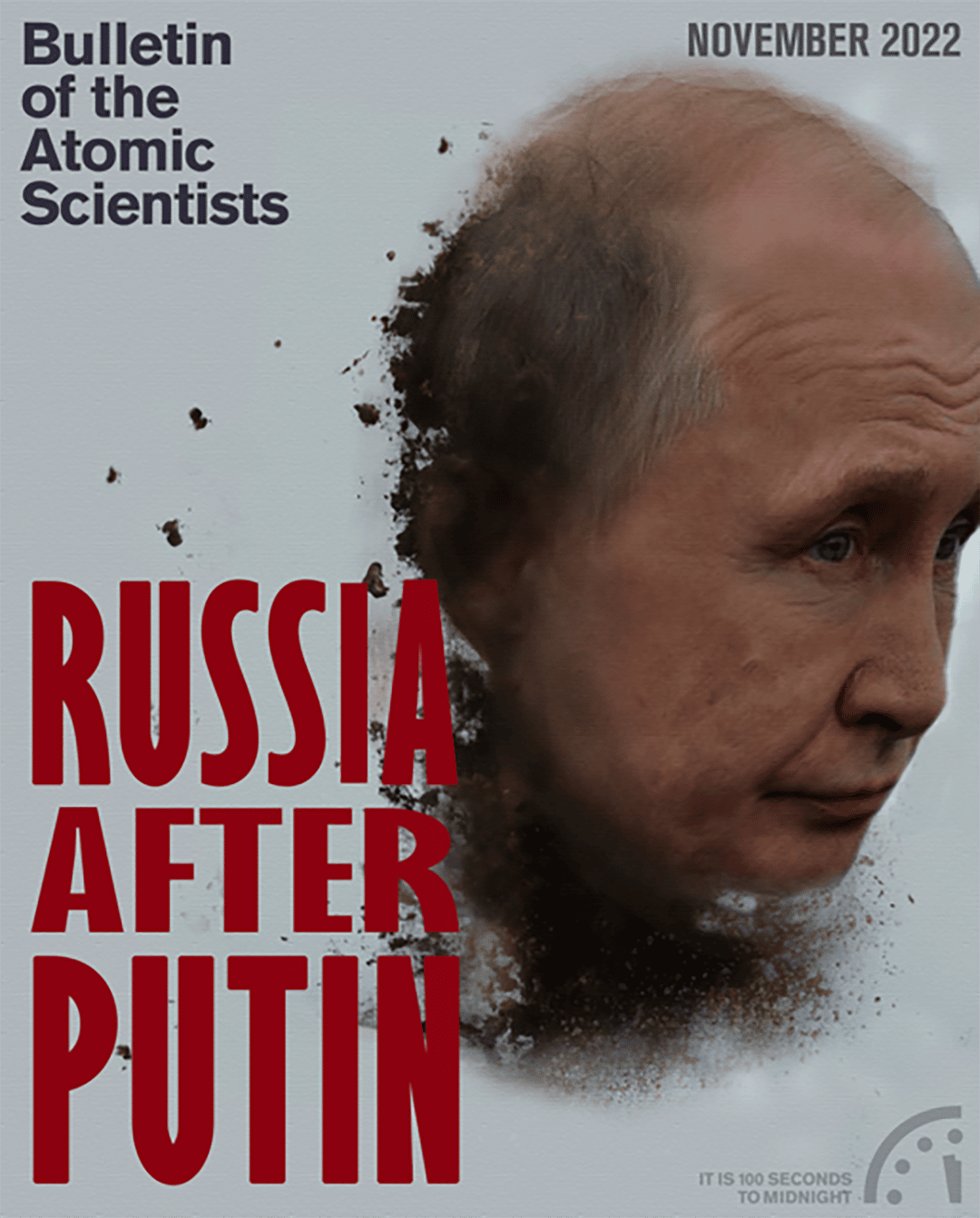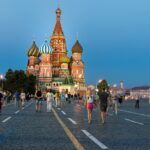Putin’s psychology and nuclear weapons: the fundamentalist mindset
By Charles B. Strozier, David M. Terman | November 9, 2022
Putin’s psychology and nuclear weapons: the fundamentalist mindset
By Charles B. Strozier, David M. Terman | November 9, 2022
Since the beginning of his war in Ukraine, Russian President Vladimir Putin has repeatedly threatened to use nuclear weapons. Those around him have also begun making nuclear threats. Such threats take us all into an unfamiliar political and psychological realm. The danger is not just large-scale destruction but the total collapse of human civilization. The possibility of using nuclear weapons introduces into what is an old-fashioned ground war in eastern Europe an apocalyptic image of the end of life as we know it.
Even at a regional level, Russian threats pose great dangers. Keep in mind that a bomb the size of the one dropped on Hiroshima would today be considered “small” and “tactical.” If dropped on Kyiv, a city of nearly 3 million people, the suffering would be enormous. Nuclear weapons also bring with them the contamination of radiation that lasts for generations. The dread of radiation, furthermore, has assumed new meaning in the age of COVID-19: Both are tasteless, invisible, and potentially lethal. The environment of fear created by a multi-year pandemic has arguably amplified fears of radiation. In both cases, the dread is real for policy makers, but the wider population largely experiences it as an unconscious fear of invisible malignant penetration.
Putin has taken maximum strategic advantage of both fears. As authors Robert Jay Lifton and Richard Falk have argued (1982), repeated threats to use nuclear weapons are themselves a form of weapons use, because such threats distort democratic institutions in fundamental ways. Given his autocratic power in Russia, Putin’s talk must be taken seriously. His threats are not loose rhetoric. They have stymied Western responses to his wanton aggression in Ukraine. He has had his army kill civilians as it seizes territory in the Donbas region and beyond. The West doesn’t dare impose a no-fly zone, or provide all the sophisticated weapons systems that Ukrainian President Volodymyr Zelensky has desperately requested.
The West has provided palpable support for Ukraine but necessarily stopped short of a military response that would defeat Russian forces. The dread is that the actual defeat of the Russian forces would humiliate Putin personally. Backed into a corner, he could well unleash nuclear weapons. That is not an idle fear.
Putin’s paranoid personality
As experts on psychology, we are especially concerned by Putin’s paranoia and its relationship to what the psychoanalyst Heinz Kohut called the group self (Kohut 1985, 83, 175-176, 206-207, 241-247). The group self is a psychological structure shared by members of a group. It consists of common goals and ideals born of historical experience. The group self can describe the psychological relationship that develops between a paranoid, charismatic leader and his followers in moments of historical crisis.
We know something about Putin’s psychology from his frequent speeches and press conferences since his rise to power in the 1990s. Putin seems to believe his propaganda that NATO was about to attack Russia and that its war was an act of defensive survival. He talks constantly of enemies surrounding his country. The West encroaches.
Putin’s behavior fits logically into what appears to be an enactment of his personality structure that is centered on a paranoid gestalt. Always grandiose to a fault, Putin appears in recent years to have surrounded himself with yes-men who applaud his vision for a recovery of Russia’s imagined greatness and feed his fantasies of American and Western conspiratorial intentions. He has throttled the press and cut off dissent, which limits the marketplace of alternate ideas. He is the new Leader, the great one who alone possesses the ability to carve out an exalted history for Russia.
He also may have been affected by the pandemic. He seems to have responded with fear and dread to COVID. Those huge tables at which he interviews foreign visitors, and the extreme distance between him and even his own advisers, suggest his need for an exaggerated isolation from potentially contaminated others. Death anxiety appears to have amplified his psychological distress.
Putin’s reading of Russian history
To help us understand Putin’s worldview, Timothy Snyder, a noted Russian historian, has brought to our attention the significance of Ivan Ilyin’s thought and work. Ilyin was a mid-20th century White Russian émigré who wrote numerous books describing a fascist political order in which Russia is historically innocent and surrounded by evil. In Ilyin’s view, it is Russia’s mission to safeguard civilization and the “good” by producing a great Leader who will save Russia and vanquish the evil other—the West.

This framework informs Putin’s understanding of, and reaction to, his experience of Russia since the fall of the Soviet Union as one of being caught up in unrelenting and ongoing humiliation. His read of history is that the West has gloated over winning the Cold War and has successively plucked off many of the former Soviet republics as Western puppets. NATO has extended its reach to the border of Russia, while the United States has arrogantly and intolerably grabbed the world’s wealth.
This discourse of aggrievement roams into wild fantasies of Russia’s right to its imperial ambitions in Ukraine. A profound humiliation set in at the sudden loss of the empire, aggravating the economic and social chaos of the 1990s. In time Russia recovered economically, but the humiliation lingered and became a deep wound that Putin has inflamed to his own political advantage. He regards Ukraine as a fake state that historically remains an integral part of the sacred “Mother Russia.” As the Russian scholar Tatiana Stanovaya argued recently in the New York Times, Putin considers the Ukrainian language a mere dialect of Russian and imagines in the near future a “Russification” of the country that would include a purge of its elites, dethroning its national heroes, renaming the streets, and rewriting the history books (Stanovaya 2022). Putin lays out such ideas with an absolute certainty that is the coinage of paranoia.
Putin’s demonization of the West connects with a deep strain in Russian history. His grandiose vision for a great Russian civilization obliterates Ukrainian identity on the way to vanquishing the decadent and evil West. It is an open question whether such views represent most Russians. In a psychological sense, it may not matter. Putin’s vision perhaps speaks to unconscious aspirations that are more elusive. Historically, Russians have been content to be ruled autocratically by paranoid leaders as the empire has expanded steadily over the centuries—until its power and prestige suddenly collapsed at the end of the Cold War and the breakup of the Soviet Union.
Putin’s grievances and the group self
Our concern is the relationship between the paranoid certainty of Putin and the dangerous comfort he provides for the tormented and confused group self of Russia. Putin calls forth an imagined vision of a great past that is projected forward as millennialism—the yearning for an apocalyptic renewal. Putin’s paranoid style of cognitive organization occurs in response to injuries to the pride, power, and ideals held by the group. His individual psychology responds perfectly to the sense of injury in a group yearning for firm answers during chaos. His own injured self-esteem matches the injured pride and honor of the group. Putin’s grievances and those of a troubled Russia in the last few decades have become synergistic and have generated enormous rage.
There is an interesting and important symmetry or congruence between the individual and the group in this regard. The leader of groups that develop this psychological organization is usually paranoid. His (and most such leaders are men) individual development has been marked by childhood experiences of deep shame, humiliation, and often neglect. Such treatment leaves him prone to boundless narcissistic rage and a need to see any failure or weakness as the work of a malevolent other. It also results in a personality structure in which normal childhood grandiosity becomes exaggerated in adulthood: He is perfect and all-powerful. However, such a structure is fragile and easily threatened with collapse and dissolution with the experience of failure, frustration, or defeat.
The fundamentalist mindset
Paranoia and millennialism, in other words, share a common psychological basis in what we have written about as the “fundamentalist mindset” (Strozier et al. 2010). Too often scholars think of fundamentalism as restricted to certain types of attitudes within religion.
Fundamentalists are thus rigid and literal in their interpretation of sacred texts, insist on imposing traditional values, and hold absolute beliefs about the truths of their God.

Our concern is to examine the phenomenon of fundamentalism psychologically and in the political and historical realm. Such a mindset involves thinking in rigid dualistic categories. A sense of the evil other lies at the heart of fundamentalism. The world is a dangerous place that is devoid of empathy. We are not all in it together. The evil can take a variety of forms to fit the historical moment. For Putin the West embodies degradation, corruption, and lustful impulses that threaten traditional Russian values, even though in holding these views he is out of sync with many Russians who are yearning for the very freedoms he disdains.
Putin’s belief is that his true Russia represents the good that must deal with evil. Such a Manichean distinction reduces the struggle to a binary choice between an idealized good Russia and the bad West. It is in the nature of the fundamentalist mindset to totalize the difference between good and evil. Totalism, as Robert Jay Lifton has written, is the crucial psychological process of making something relatively manageable in the public space by creating great rivalries that spawn paranoia and violence and keep hatreds burning bright (Lifton 1961). Rage becomes chronic and ingrained. The “other,” deemed evil in what emerges as a radical fundamentalist mindset, comes to embody the taint of sin. That other must be dispensed with, and in fact his elimination assumes something of an ethical obligation to achieve perfection in the world. To kill therefore is to heal, and in this context one could even say that killing makes one a savior. Violence becomes a moral imperative, lending what is typically an apocalyptic cause a profoundly important and powerful ethical dimension.
The fundamentalist mindset requires an apocalyptic mission of the group.[1]
The perfect world will be reborn in an imagined future created by the select few: the “remnant” in the Book of Revelation, the Nazis in Germany, the true Muslims for ISIS. The evil other must be exterminated to initiate the violent process of renewal. Injury to the group’s sense of self—in the form of a loss of power, discrediting of its ideology, or economic or political deterioration—results in shame, humiliation, and rage in the group. The humiliation is intolerable. When an individual has this type of cognitive organization, he wreaks disturbing violence in the name of offended pride. Such reactions are typical of a cuckolded husband, a gang defending its territory, or a nation feeling encircled. The most dangerous form of paranoid violence, however, is the response to a feeling of heightened victimization by the “other.” Feeling shamed and fearful that one’s very essence is about to be destroyed, the paranoid leader attacks to ward off the imagined danger posed by the other and restore the integrity of the damaged self.
The paranoid leader is exquisitely sensitive to what he experiences as an injury or humiliation. That attitude lies at the heart of the violent potential within paranoia. In Putin’s case, it seems to have motivated him to start a war without any apparent provocation.
Echoes of Nazi and Al Qaeda millennialism
We have seen this dynamic relation between a paranoid leader and his troubled followers before in history, but nowhere more powerfully than in Nazi Germany. In post-World War I Germany, a widespread humiliation gripped a war-torn people. Fighting on two fronts, the Germans prevailed gloriously in the East, where they soundly defeated the badly equipped Russian armies. In the Treaty of Brest-Litovsk in 1918, Lenin gave away vast stretches of land to secure peace so he could pursue the Bolshevik revolution. In the West, however, where it really mattered, the Germans lost the war decisively and were forced to sue for a peace that ended with harsh terms in the Treaty of Versailles.
Throughout the war and especially at the end, ordinary Germans were force-fed a diet of propaganda about their victories in the East, ignoring the defeats in the West. The result was a disoriented people, humiliated and discouraged, mired for years in an economic decline that plummeted into devastating depression in the late 1920s. Their leaders had deserted them. They were lost and bereft. They must have been stabbed in the back. Only the certainty of a ranting paranoid leader brought a measure of hope. As David Redles has shown, the foot soldiers in the early days of the Nazi movement saw in Hitler an idealized figure who could bring meaning to a devastated people (Redles 2010). In Kohut’s own terms, a disoriented and fragmented German postwar group self found, in the experience of their charismatic leader, a sufficient measure of cohesion to justify total obedience to a message that promised war, suffering, and death—but also hope in its apocalyptic dream of a thousand-year Reich (Kohut 1985, 171–217).
Echoes of Nazi millennialism can be heard in the writings and speeches of Osama bin Laden, the late head of Al Qaeda. Like Hitler, bin Laden was a charismatic leader who built a violent organization with the goal of destroying its enemies. Following in the ideological footsteps of Egyptian scholar and author Sayyid Qutb, bin Laden carefully crafted his persona. “Dressed in flowing robes and mounted on horseback,” and “producer and director of his own theater of cruelty,” bin Laden wrote explicitly about humiliation (Corbin 2003, 24; Stern and Berger 2015, 194). His 1996 and 1998 fatwas and his 2002 “letter to the American people” make references to two types of humiliation: that inflicted by the Mujahedeen (and Allah) on the Americans and their allies (the Crusaders), which is invoked as a glory, and that inflicted on the Muslim ummah (Arabic for “nation” or “community”) by Americans and their allies, which is invoked as a traumatic wrong that must be righted through violent action. In his 1996 fatwa, bin Laden lists the causes and basis for Muslim humiliation, and in his 1998 fatwa he articulates, for the first time, the Jihadi movement’s universal declaration of war.
Bin Laden writes in the 1996 fatwa, in which he uses the Arabic word for “humiliation” nine times, “Death is better than life in humiliation! Some scandals and shames will never be otherwise eradicated.” Like the Nazis who longed for a unified Germany with one shared race and religion, and believed in a demonic conspiracy of Jews and their allies, bin Laden wanted a unified, pure Muslim ummah ruled by Sharia (God’s law) and was convinced that a Zionist-Crusader alliance was working against the Muslim ulama (religious scholars) and the leaders of the Jihadi movement, chipping away at Al Qaeda’s main issue: “the unification of the people under the divine law of Allah” (Bin Laden 1996).

To be humiliated is intolerable and must be avenged. The oppressed find redress by humiliating the oppressors. To be able to humiliate is power in itself and, for bin Laden, the ultimate experience of humiliation is reserved for the enemies of Allah—the sign of the ultimate victory. “In Afghanistan they have made vows to Allah that as long as they are alive, they will continue to carry arms against you until you are—Allah willing—expelled, defeated and humiliated.”
Making room for retreat
Humiliation is at the heart of this intersection of paranoia and millennialism. The nature of Putin’s apocalyptic vision, and of the war he has unleashed to realize it, makes defeat unacceptable. It would represent massive humiliation. His fundamentalist worldview is so extreme that it doesn’t allow for compromise. The very goodness of the world, of himself, and, most significantly, of Russia are at stake. Defeat would shatter the foundations of his elaborate belief system, not to mention his self-structure. There is nothing more absolute for the fundamentalist leader than not retreating from a field of battle that has assumed apocalyptic meaning. Suicide is the only option, as Hitler came to feel while watching his dreams of the thousand-year Reich evaporate.
Putin has given himself a choice Hitler lacked. He need not accept defeat on the battlefield. This reversal contradicts the conventions of war long established in the West. Cornwallis admitted defeat when he found himself surrounded by Washington’s army; Napoleon met his Waterloo; Robert E. Lee surrendered to Ulysses S. Grant at Appomattox; and the Japanese accepted the inevitable after the United States dropped two atomic bombs in August 1945. Surrender of defeated armies in the field has always been the nature of warfare, often reversing and undoing the apocalyptic fantasies of charismatic and paranoid leaders. But nuclear weapons radically change that calculation.
An awareness of the psychological vulnerabilities of Putin in the Ukraine war could help offset the possibility that he would actually use nuclear weapons. His aggression needs to be stopped, but Russia can’t be humiliated or backed into a corner in the process. There may be hope, however, in the very grandiosity of Putin’s imperial dreams. He imagines hegemony over a vast territory and influence on a geopolitical scale. Ukraine is only one piece of that larger vision. Russia must feel it has preserved a respected role in any final settlement, including the shared need to preserve human civilization.
The larger issue, of course, is the presence of nuclear weapons in the world. Their very existence alters the meaning of war, indeed of violence itself. Once-familiar conflicts between nations assume existential meanings when millennial fantasies about creating a utopia on Earth are woven into the fabric of geopolitical aspirations. There is no simple answer to this dilemma. At the very least, as humans we must recognize that the only rational and meaningful course of action is nuclear abolition. The Bulletin’s famous Doomsday Clock must have its hands turned back, rather than continually moved forward.
[1] There is a distinction between the violence of apocalyptic transformation, and the utopianism that yearns for the renewal of human potential. The apocalyptic narrative that requires violence for renewal should not be confused with the utopian dreams of social movements like antislavery in the 1830s, Gandhi’s satyagraha of nonviolent resistance, the Civil Rights Movement from the mid-1950s to the mid-1960s, or the contemporary yearning for saving the planet from the ravages of global warming. Wetic need our dreams. Utopias are essential in motivating social action.
Together, we make the world safer.
The Bulletin elevates expert voices above the noise. But as an independent nonprofit organization, our operations depend on the support of readers like you. Help us continue to deliver quality journalism that holds leaders accountable. Your support of our work at any level is important. In return, we promise our coverage will be understandable, influential, vigilant, solution-oriented, and fair-minded. Together we can make a difference.
Keywords: Putin, fundamentalist mindset, group self, millennialism, nuclear weapons, psychology
Topics: Special Topics






















